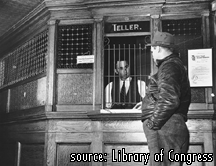We know that banks have money but how do they work. How does a bank
pay their bills? Look below and discover how!
How Does A Bank Make Money?
 When a bank lends money, it charges interest on the borrowed money.
To remain in business, a bank must earn enough interest income to cover
the interest payments to depositors as well as its other expenses (such
as employee salaries, equipment, rent, etc.). To do this, banks charge a
higher interest rate on money it lends to borrowers than it pays out on
money deposited by savers. This is how a bank makes money. When a bank lends money, it charges interest on the borrowed money.
To remain in business, a bank must earn enough interest income to cover
the interest payments to depositors as well as its other expenses (such
as employee salaries, equipment, rent, etc.). To do this, banks charge a
higher interest rate on money it lends to borrowers than it pays out on
money deposited by savers. This is how a bank makes money.
|